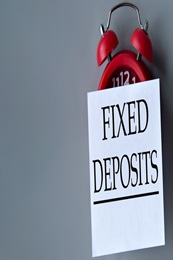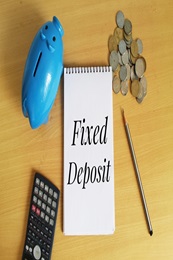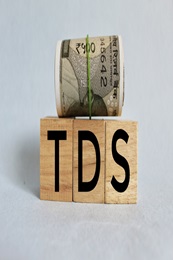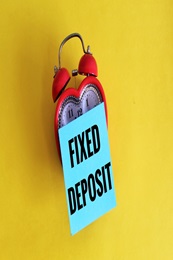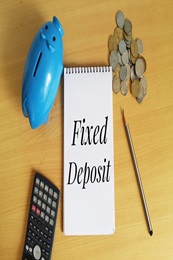What is a Standalone FD? Unlocking the Flexibility of Independent Fixed Deposits
April 15, 2025

In the world of Fixed Deposits (FDs), a standalone FD is a unique and flexible financial product that allows you to invest without the need to open or maintain a savings account with the bank. This type of FD offers the same benefits as a regular FD, such as guaranteed returns and safety, but with one key difference: you don’t need to have a savings account with the bank to open the account.
For individuals who may already have a savings account elsewhere or prefer keeping their finances separate, a standalone FD provides the perfect solution. But what makes this type of FD stand out? Let’s dive deeper into how standalone FDs work, their benefits, and why they could be the right choice for your financial portfolio.
What Makes Standalone FDs Different?
At its core, a standalone Fixed Deposit is an investment option that allows you to deposit a lump sum amount for a fixed tenure with a bank or financial institution. Unlike traditional FDs that require you to have an active savings or current account with the same bank, standalone FDs let you invest without this additional requirement.
Here’s a quick look at how it works:
- No Account Linkage: You can open a fixed deposit without the need to open a savings account at the same bank.
- Flexible Tenures: Like other FDs, standalone FDs come with flexible tenures ranging from 7 days to 10 years.
- Attractive Interest Rates: Standalone FDs generally offer competitive interest rates, ensuring that your money grows safely over time.
- Guaranteed Returns: Your investment earns a fixed rate of interest, regardless of market fluctuations.
Key Benefits of Standalone FDs
- Simplicity and Convenience: You don’t need to go through the hassle of maintaining a savings account, making it ideal for people who prefer minimal banking relationships or already have accounts elsewhere.
- Higher Interest Rates: You can enjoy higher interest rates if you open an FD with Ujjivan Small Finance Bank. Senior Citizens qualify for an additional interest rate of 0.50% above standard rates.
- Safe and Secure: Like all fixed deposits, standalone FDs are a low-risk investment option. The capital is protected, and the returns are predictable.
- Higher Liquidity: In case of an emergency, you can choose to prematurely withdraw your FD (though with a penalty). This liquidity can be helpful without tying up your savings account balance.
- Tax Benefits: Just like regular FDs, standalone FDs can be used for tax-saving purposes if they qualify under Section 80C (Tax-Saving Fixed Deposits).
Who Should Opt for a Standalone FD?
Standalone FDs are ideal for:
- Individuals with multiple bank accounts who prefer keeping their investments separate from their savings accounts.
- People seeking diversification in their financial portfolio without complicating their banking setup.
- NRIs who want to open an FD in India but don’t wish to open a local savings account.
If you’re someone who values the autonomy of managing finances across different banks or wants an easy way to invest without a savings account, a standalone FD could be a perfect match.
How to Open a Standalone FD?
Here’s how you can open a standalone Fixed Deposit with Ujjivan Small Finance Bank.
Step 1: Enter your mobile number, PAN and Aadhaar
Step 2: Enter Deposit details and complete the payment
Step 3: Provide personal details
Step 4: Complete video KYC (08:00 AM To 08:00 PM)
Receive FD receipt and maximize your returns!
Final Thoughts
Standalone FDs are a perfect choice for those looking for flexibility and simplicity. Whether you’re someone who already has a savings account with another bank or simply prefer to keep your investments and savings separate, standalone FDs provide an easy, risk-free way to grow your money. With competitive interest rates, guaranteed returns, and the ability to maintain your financial independence, standalone FDs should definitely be considered in your investment strategy.
Looking to grow your savings faster? Ujjivan SFB offers a wide range of fixed deposit products. Select the FD of your choice and take a step forward to your financial goals. Alternatively, you can browse through Ujjivan SFB product suite - our wide range of financial products are designed to make your financial life better.
FAQs
1. Can I open a standalone FD without a savings account?
Yes, a standalone FD does not require you to have a savings or current account with the bank.
2. Are the interest rates on standalone FDs the same as regular FDs?
Generally, yes. Standalone FDs offer interest rates similar to or slightly higher than regular FDs.
3. Can I withdraw my money before the maturity date?
Yes, premature withdrawal is possible, but it may attract a penalty on the interest earned.
4. Is tax deducted at source (TDS) applicable on standalone FDs?
Yes, TDS is applicable on the interest earned from standalone FDs if the interest exceeds the prescribed limit.
5. What happens if I don’t have a savings account in the bank where I open the FD?
Your fixed deposit will still be valid, and you’ll earn interest as per the agreed terms without needing an active savings account.
6. Are standalone FDs safe?
Yes, standalone FDs are as safe as regular FDs and are covered under the Deposit Insurance and Credit Guarantee Corporation (DICGC) up to ₹5 lakh per depositor, per bank.
7. Can I link a standalone FD to my existing savings account later?
Generally, standalone FDs cannot be linked to a savings account after opening. You would have to close the FD and open a new one with the linked account if required.
8. Are there any penalties for premature withdrawal of standalone FDs?
Yes, premature withdrawal usually results in a penalty on the interest earned, which may be lower than the rate originally promised.
Latest Blogs

Telangana Housing Board & KPHB Colony: A Guide to Affordable Urban Housing in Hyderabad
March 14, 2025
As Telangana continues its rapid urbanisation journey, two key housing entities—Telangana Housing Board (THB) and Kukatpally Housing Board Colony (KPHB)—have played critical roles in shaping the state's real estate ecosystem.

Does Checking CIBIL Score Frequently Lower Your Credit Points?
April 07, 2025
Imagine you're planning to apply for a home loan, a credit card, or even a car loan. Naturally, you want to ensure your CIBIL score is in good shape before proceeding.

Explained: Can NRIs Buy an Agricultural Land in India?
April 03, 2025
Real estate investment is often a top priority for Non-Resident Indians (NRIs) looking to retain strong financial ties to India.

How to Improve Your CIBIL Score from 600 to 750: A Step-by-Step Guide
April 02, 2025
Your CIBIL score is like your financial reputation—banks check it before approving loans or credit cards. If your score is hovering around 600, you might face difficulties in securing credit or may get loans with higher interest rates.

What Happens When You Leave Your Savings Account Unused?
April 01, 2025
Imagine waking up one day to find that your hard-earned money is locked away and inaccessible. Sounds stressful, right? This is precisely what happens when you leave your Savings Account inactive for too long.

